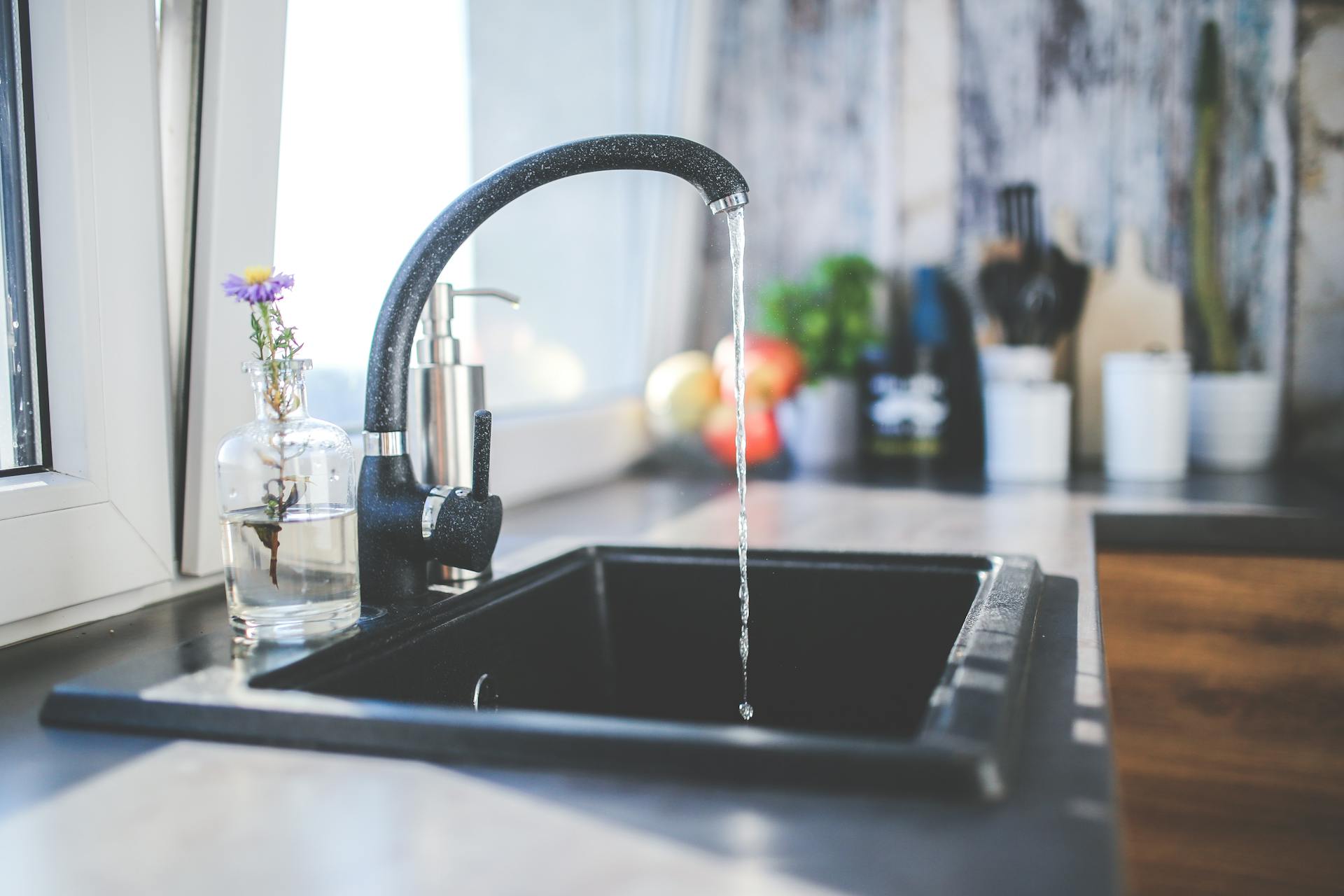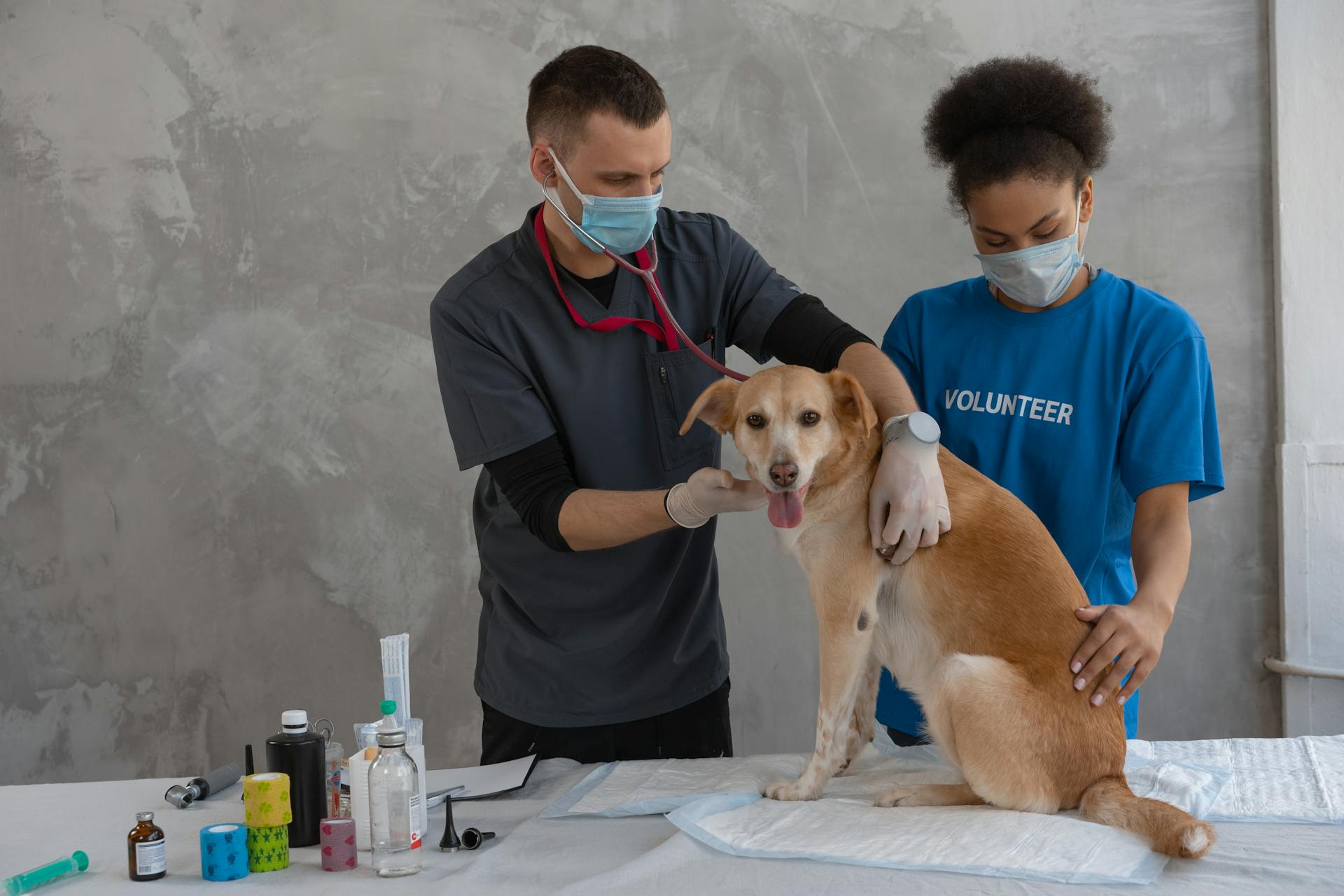
Tear stains can be a frustrating issue for many dog owners. They can be a sign of a underlying health issue, such as a tear duct problem or allergies.
The source of tear stains is often a mystery, but one potential culprit is tap water. Some people believe that the chlorine in tap water can cause tear stains in dogs.
However, it's worth noting that the relationship between tap water and tear stains is still unclear. More research is needed to determine the exact cause of tear stains in dogs.
In the meantime, if you're concerned about the chlorine in your tap water, you can consider using a water filter or alternative water source, such as a well or spring water.
For your interest: Distilled Water for Dogs Tear Stains
What Causes Tear Staining in Dogs
Tear staining in dogs is a common issue that can be caused by a variety of factors.
Most dogs with tear stains don't have an underlying eye problem, but it's still a good idea to have your vet check them out to rule out any potential health concerns.
You might enjoy: Why Do Maltese Dogs Have Tear Stains
The characteristic reddish-brown color of dog tear stains is caused by an iron-containing dye molecule called porphyrin. Porphyrin is released when the body breaks down red blood cells and is excreted in tears, saliva, and urine.
Dogs with tear stains often have variations in their eyelid structure that cause tears to drain onto the face instead of down the nasolacrimal duct.
Excessive tears can exacerbate tear staining, but it's the naturally occurring molecule porphyrin that causes the reddish-brown discoloration under a dog's eyes.
Here are some potential causes of tear staining in dogs:
• Excessive tears
• Variations in eyelid structure
• Porphyrin in tears
• Blocked nasolacrimal duct
• Medical conditions such as infections or allergies
• Environmental factors like plastic food bowls or high-iron water
• Dietary factors like red meat or iron-rich foods
By understanding the potential causes of tear staining in dogs, you can take steps to reduce the staining and keep your furry friend looking and feeling their best.
Consider reading: Tear Stains
Removing and Preventing Tear Stains
Removing tear stains from dogs can take some experimentation, so it's essential to rule out underlying medical conditions first. If a medical condition is suspected, follow your veterinarian's recommendations for removing the tear stains and treating your pet's condition.
You can use over-the-counter eye wipes, eye washes, and other at-home remedies to clean your pet's tear stains. Some popular options include Optixcare Dog & Cat Eye Cleaning Wipes, Petpost Tear Stain Wipes for Dogs, and Miracle Care Eye Clear Cleaning Pads for Dogs & Cats.
Cleaning the area around your pet's eyes regularly can help prevent tear stains from developing. Keep the hair around your pet's eyes trimmed short, and use a slightly damp washcloth or cotton ball to clean the area at least twice every day.
Some supplements claim to reduce the amount of porphyrin in the tears, which can lead to less dyeing of the fur. Examples include Angels' Eyes Natural Chicken Flavored Soft Chew Tear Stain Supplement for Dogs & Cats and NaturVet Tear Stain Plus Lutein Soft Chews Supplement for Cats & Dogs.
Worth a look: How to Flush a Dogs Eye with Water
To prevent tear stains, you can also try giving your pup purified, distilled water rather than tap or well water, and switching to dog food that doesn't contain beef, which is high in iron.
Here are some effective home remedies to clean tear stains:
- Mix one part hydrogen peroxide with 10 parts water.
- Boil one tablespoon of boric acid powder in one cup of distilled water.
- Use contact lens solution, which contains boric acid that oxidizes the iron in porphyrins and can help lighten stains.
- Dab cornstarch over the stains to help absorb moisture.
Remember, every dog responds differently to these methods, so it may take some experimentation to find what works best for your pet. Be patient, and with a bit of effort, you can keep your dog's face clean and happy.
Checking and Cleaning
Mixing a solution of mild hydrogen peroxide and water is a great way to clean tear stains on your dog's face. Dip a cotton ball into the solution and wipe away from the eyes to avoid any irritation.
You can also rely on specially formulated dog wipes, which can be applied to your dog's eyes, nose, and mouth every morning. These wipes can be a convenient and easy way to keep your dog's face clean.
Take a look at this: Why Do My Dogs Eyes Water so Much
Trimming the hair around your dog's eyes can also help prevent tear stains. Excess fur can hold onto gunk buildup and crust, so it's a good idea to trim it regularly.
Here are some home remedies you can try to clean tear stains naturally:
Remember to always avoid getting any solution into your dog's eyes, and rely on verbal praise and treats to make the process as stress-free as possible.
Understanding Dog Health
Dog tear stains can be a frustrating issue for many pet owners. Most dogs with tear stains don't have an underlying eye problem, but it's always a good idea to consult with your veterinarian if your pet didn't previously have tear stains and is now developing them.
Tap water can contain iron and other minerals that may exacerbate tear staining in dogs. Switching to purified, distilled water can help reduce the amount of porphyrin in your dog's tears, which can help minimize staining.
If your dog is prone to tear staining, you may want to consider switching to a dog food that doesn't contain beef, as red meat is high in iron.
Possible Medical Concerns
Dog tear stains can be a concerning issue for pet owners, and it's essential to consider possible medical concerns that may be contributing to them.
Some health issues that can cause watery eyes and tear stains include glaucoma, conjunctivitis, and eye infections. These conditions require prompt veterinary attention to prevent long-term damage.
Eye infections can cause redness, discharge, and swelling around the affected eye. If you notice any of these symptoms, it's crucial to consult your veterinarian immediately.
Ingrown eyelashes can also cause tear stains, and in severe cases, can lead to eye infections. Regular grooming and veterinary check-ups can help prevent this issue.
Allergies can exacerbate tear stains, and if you suspect your dog has allergies, it's best to consult with your veterinarian for proper diagnosis and treatment.
Here is a list of possible medical concerns that can cause tear stains in dogs:
- Glaucoma
- Conjunctivitis
- Eye infections
- Ear infections
- Ingrown eyelashes
- Allergies
What Are Dogs
Dogs are prone to tear stains, which are reddish-brown stains that appear on their muzzle due to an underlying health condition or tear duct issue.

Tear stains are more common in dogs with certain facial characteristics, such as a short nose and large eyes.
Dogs with flat faces, white fur, or congenital tear duct abnormalities are more likely to develop tear stains.
Some breeds, like Bulldogs and Pugs, are more predisposed to tear stains due to their facial structure.
Tear stains can lead to infection if they're not cleaned properly.
The nasolacrimal duct is responsible for draining tears from the eyes to the inside of the nose.
Here are some breeds that are more likely to develop tear stains:
- Bulldogs
- Boxers
- Lhasa Apsos
- Pekingese
- Pugs
- Bullmastiffs
- Boston Terriers
- Shih Tzus
- Maltese
- Poodles
- Cocker Spaniels
- Schnauzers
- Dachshunds
- Cairn Terriers
- West Highland White Terriers
- Samoyeds
- Bichons Frises
- Labrador Retrievers
- Golden Retrievers
Dealing with Unwanted Issues
Dog tear stains can be a real nuisance, but the good news is that most cases aren't caused by an underlying eye problem. If your dog has tear stains, it's likely due to variations in the eyelid structure that cause tears to drain onto the face instead of down the nasolacrimal duct.
Contact your veterinarian if your pet didn't previously have tear stains and is now developing them. This is especially important if your dog's tear stains seem to be accompanied by other symptoms like redness or discharge.
If your vet confirms that your dog's tear stains are not caused by a health issue, there are some practical steps you can take to reduce the staining. For example, you can try switching to a dog food that doesn't contain beef, as red meat is high in iron and may make staining worse.
Dog Food Side Effects
Some dog foods can cause tear stains due to environmental causes, such as plastic food bowls or high-iron water.
Plastic food bowls can cause a reaction in some dogs, leading to dark staining around the eyes.
Tap and well water can contain iron and other minerals that may make staining worse.
Switching to purified, distilled water can help reduce porphyrin in dogs, which is a primary cause of staining.
Dog food that doesn't contain beef may also help reduce porphyrin in dogs, since red meat is high in iron.
By making these simple changes, you can help reduce the risk of unwanted tear stains in your furry friend.
You might enjoy: Raised Water Bowls for Dogs
Dealing with Unwanted Dogs
Dealing with Unwanted Dogs can be a frustrating and overwhelming experience. Some dogs may have tear stains that require ongoing home treatment and maintenance.
Cleaning existing tear stains is just one part of the process. You may need to try different products and home remedies to find what works best for your dog.
Be sure to check with your vet before administering any home treatment to ensure safety, just like with any new product or remedy.
Frequently Asked Questions
Does distilled water get rid of tear stains?
Yes, switching to distilled water may help reduce tear stains in dogs, as seen in a case where tear stains decreased significantly after a week of using only distilled water. However, more research is needed to confirm this as a reliable solution.
Sources
- https://www.petmd.com/dog/general-health/dog-tear-stains
- https://www.akc.org/expert-advice/health/tear-stains-prevent-and-clean/
- https://www.smithfieldanimalhospital.com/services/dogs/blog/veterinary-guide-stubborn-tear-stains-dogs
- https://petcube.com/blog/dog-tear-stains/
- https://www.caninejournal.com/tear-staining-on-dogs/
Featured Images: pexels.com


